7 Questions to Ask Before Hiring a Google Ads Consultant

%20(2).png)
Hiring a Google Ads consultant sounds like the obvious next step when growth slows down or in-house bandwidth hits a wall. It’s also one of the highest-leverage decisions you make as an eCom brand.
But it’s also where a lot of brands get stuck. You speak to someone who sounds credible, they’ve worked with brands you recognise, and they show you audits, dashboards, and results.
A few months later… performance is flat, the strategy feels unclear, and you’re back to wondering if the issue is your product, your offer, or the platform itself.
When you hire the right consultant, it can unlock scale, sharpen your strategy, and bring clarity to what is and isn’t working inside your Google Ads account. When executed poorly, it drains budget, flatlines growth, and leaves you wondering whether Google Ads works for your business.
After working with hundreds of 7-9 figure eCom brands, we know that Google Ads works for brands, but only when you have the right people managing your campaigns.
We’ve audited 500+ accounts from eCom brands who came to us after hiring someone who looked good on paper. In nearly every case, the warning signs were there. They just weren’t asking the right questions.
This article gives you 7 questions that cut through the pitch and get to the heart of how a top Google Ads consultant works; how they think through complexity, handle performance shifts, and guide your growth.
If you want someone who treats your ad account like a business engine and not a dashboard, this is where to start.
1. How do you structure campaigns for large or complex product catalogues?
Campaign structure is one of the most overlooked drivers of profitability in Google Ads. It determines how:
- Budget flows
- Learnings accumulate
- and how scalable the system becomes
Brands with large catalogues or multiple product categories require thoughtful segmentation. A strong Google Ads consultant will ask about:
- Product lines
- AOV brackets
- Margin variation
- Inventory cycles
- and seasonal patterns before proposing a campaign plan.
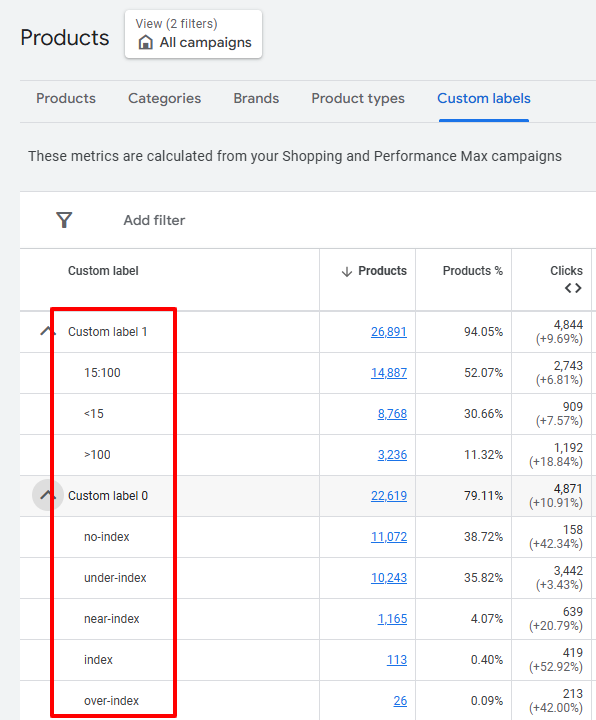
They will also consider which SKUs are hero products, which serve as entry points, and which contribute to repeat purchase behaviour.
Ultimately, campaigns should reflect business logic.
That might involve separate campaigns by category, custom labels based on margin, or distinct setups for promotional inventory. It may also involve isolating high-volume SKUs to avoid overlap or cannibalisation.
Consultants who understand catalogue structure also understand control. They know how to protect performance in branded queries, allocate spend toward discovery, and keep learning data clean across asset groups or campaigns.
The ability to plan a structure around how a business sells rather than around Google defaults is a reliable marker of long-term success.
2. How do you approach product feed optimisation?
Google Shopping performance is shaped by how well the product feed communicates relevance:
- Titles
- Descriptions
- Categories
- and attributes form the foundation of ad visibility and targeting quality.
“A well-managed product feed enhances product visibility, leading to increased exposure in search results and ads on platforms” — DataFeedWatch
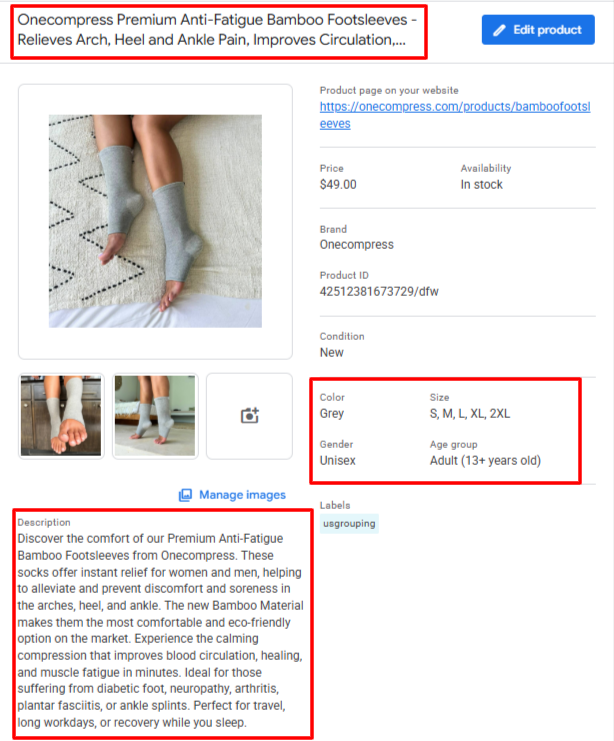
A Google Ads consultant should approach the product feed as a strategic asset. It’s also important that they request access to Google Merchant Center early, audit the health of the feed, and identify areas where missing or vague information may limit campaign potential.
A reliable way to see immediate feed issues is to review common Google Merchant Center errors.
They should also be able to explain how specific attributes impact bidding, query matching, and eligibility. This includes using custom labels to segment products for bidding, restructuring titles to match search behaviour, and enriching descriptions to improve relevance scoring.
Beyond setup, feed maintenance is also critical. Disapprovals, stock mismatches, and missing GTINs can erode campaign efficiency.
The Google Ads consultant should outline how they monitor feed integrity and what tools they use to surface issues before they impact revenue. When the feed is treated like a fixed integration, campaigns become reactive. When the feed is actively shaped and reviewed, campaigns scale more predictably and efficiently, a reliable marker of long-term success.
3. How is branded search traffic managed?
Branded search often performs well on paper, but that performance can be misleading if it’s not isolated in your reporting.
To evaluate your campaigns properly, your account needs a clear split between branded and non-branded traffic. Without that, you risk inflating ROAS and misreading how well your prospecting is working.
Imagine your prospecting campaign shows a healthy 400% ROAS. Impressive, right? But dig deeper, and you discover 70% of those conversions came from brand searches (people already looking for your company).
Your actual prospecting performance might be closer to 150% ROAS. That completely changes how you think about scaling and budget allocation.
This kind of contamination creates false confidence. You could be pouring budget into campaigns that appear to be driving new customer acquisition but are just harvesting brand demand at inflated costs.
A strong consultant will structure accounts to keep branded and non-branded traffic separate. That means dedicated campaigns for brand terms, exclusion lists where needed, and clean reporting that tells the full story. It’s the only way to evaluate cold traffic performance accurately and make confident growth decisions.
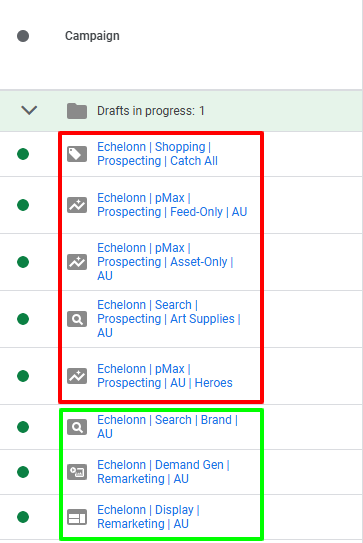
Disciplined brand protection involves assessing whether bidding on branded terms is necessary. If competitors are bidding, a defensive strategy makes sense. If not, that spend may be unnecessary and better reallocated.
A Google Ads consultant with a clear process for managing branded traffic brings sharper visibility to what the account is achieving, and avoids the trap of relying on returning visitors to make the numbers look better than they are.
4. What is the testing process for YouTube and Performance Max creative?
Creative quality plays a key role in YouTube and PMax performance. Campaigns running on visual assets need a system that supports ongoing testing and iteration.
An effective Google Ads consultant brings structure to the creative process. This may involve delivering content briefs, setting up naming conventions for tests, and mapping asset variations to funnel stages.
Performance thresholds are often used to identify fatigue and support decisions around scaling or replacing assets. Creative performance can be measured through engagement signals like:
- View rate
- Watch time
- Interaction rate
- and cost per acquisition
A strong testing process will close the loop between performance data and creative development. Creative inputs influence how Google distributes spend, interprets user behaviour, and learns over time.
Campaigns built on weak or stale content often stall, even when targeting and bidding remain strong. Where possible, a Google Ads consultant should help connect the dots between creative and conversion, maintaining alignment between message and strategy.
5. What is reviewed weekly, and what is reviewed monthly?
Account growth depends on consistent monitoring. Performance fluctuations are not unusual even with the best-performing campaigns, so the account needs constant attention to ensure any volatility is addressed immediately by checks and balances.
Short-term trends require frequent attention, while broader shifts call for deeper, less frequent analysis.
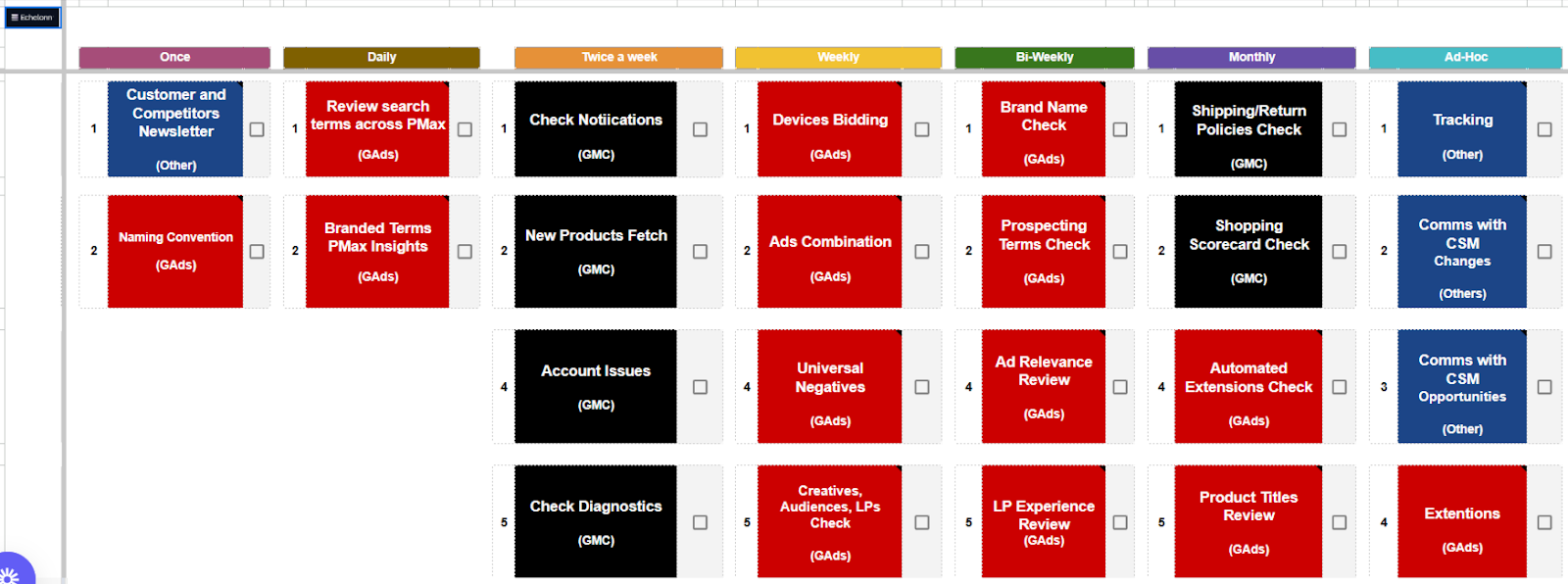
Strong weekly reviews focus on tactical performance signals. These include:
- Spend pacing
- Product feed health
- Search term data
- Creative delivery
- and early changes in conversion cost or efficiency.
Reports from these check-ins often result in minor adjustments that prevent inefficiencies from compounding.
Monthly reviews take a strategic view. These sessions may cover acquisition cost trends, cold vs warm traffic performance, content needs, margin insights, or structural opportunities across the product catalogue.
Dividing reviews into short- and long-term cadences creates rhythm and accountability. This approach also ensures that minor issues are corrected quickly while long-range decisions are informed by stable, aggregated data.
A consultant with this cadence in place can spot issues early and escalate opportunities when the data supports it.
6. How is automation configured and managed?
Automation has become a core feature of Google Ads.
Tools like Performance Max and Smart Bidding offer significant reach and efficiency if configured correctly. To get the most from automation, campaign inputs must be structured around clear business logic.
As Search Engine Land explains:
“AI Max for Search campaigns is a bundle of 3 features: expanded query matching, final URL expansion, and text asset customization — with a few cool new ‘sprinkles’ like increased transparency and ad group-level location intent settings.”

That kind of automatic feature expansion is exactly why automation requires active oversight.
That includes:
- Product feed segmentation
- Audience exclusions
- Asset grouping
- and well-calibrated conversion data
Rather than relying on automation to self-correct, consultants who guide it bring frameworks that influence how Google allocates spend. This often includes shaping signals with custom labels, creating distinct campaigns for branded traffic, and separating product types by lifecycle or margin profile.
Automation works best when its environment is clean. Poorly structured campaigns introduce noise that limits Google’s ability to learn and optimise.
With the right inputs, automation becomes an asset for efficiency and scale.
7. What actions are taken when performance declines?
As mentioned earlier, fluctuations in paid media are not uncommon. No campaign remains stable across all seasons, inventory cycles, or auction conditions.
So the question becomes less about whether performance changes. Instead, how that change is managed. Google Ads consultants with experience managing volatility will start with a diagnosis.
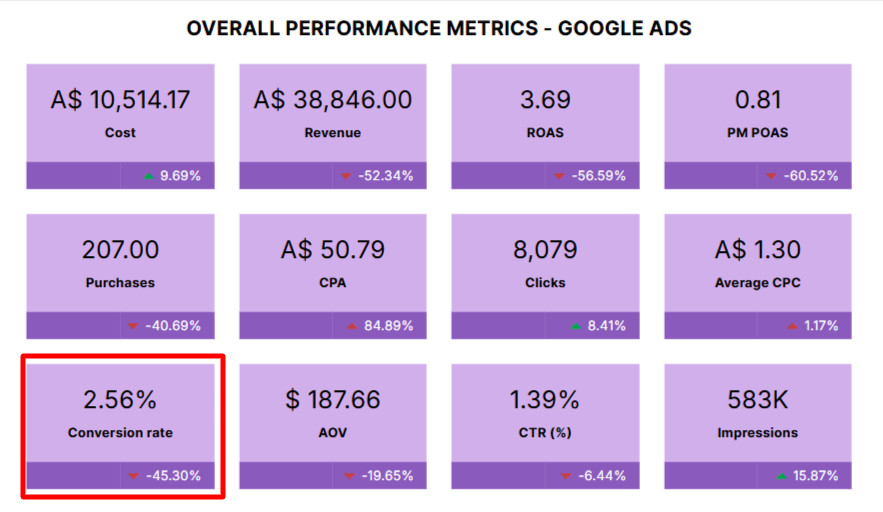
“Conversion tracking tends to be one of those things advertisers set up once and then forget about, until something fails – big time.” — Search Engine Journal
That may include:
- Reviewing feed issues
- Auction pressure
- Asset fatigue
- Attribution lag
- or structural conflicts between campaigns
From there, the focus shifts to immediate action.
This could involve:
- Restructuring bids
- Refreshing creative
- Pausing underperforming campaigns
- or segmenting traffic for more precise testing
A documented process, backed by examples of past recoveries, brings confidence to the adjustment phase. This often includes references to performance drops that were corrected through feed adjustments, exclusions, or creative strategy.
Clear communication during this phase matters. The brand team should understand what is being reviewed, what action is being taken, and when the next review will happen.
When problems are addressed through process, not panic, accounts recover faster and remain scalable under pressure.
Google Ads Consultant Checklist
Final Thoughts
Hiring a Google Ads consultant should never be seen as simply a tactical decision; it’s a strategic one.
The right Google Ads consultant can bring structure to your campaigns, help uncover hidden inefficiencies, and build a foundation for scalable, profitable growth.
But great media buying is also a whole lot more than setting up campaigns. It has to do with understanding the commercial side of your business, working closely with your product and creative teams, and managing performance like an operator instead of a technician.
When you ask the right questions, the gaps become easier to spot. You begin to see who thinks in templates and who builds with purpose.
And more importantly, you find out who’s prepared to take ownership when performance needs to change.
That’s the kind of partner every eCom brand needs, especially when growth depends on how well your Google Ads are managed.

Ready To Start Scaling Today?
Scaling Your Favorite eCommerce Brands To The Highest Levels Through Google & YouTube Ads.

.svg)
Get Smarter About How To Scale Your Brand...
Discover Insider Knowledge On How We Scale Brands From 7 Figures All The Way Up To 8-9 Figures With Google Ads.
More Articles Like This.
Find answers to common queries about our services and how we can help you.
.svg)
.png)
How Advertorials Support High-Intent Google Ads Funnels
%20(Canva%20Template).png)
How Audience Targeting Works in Google Search Ads (and When to Use It)

Google Ads for New Brands: What to Know Before Spending Your First Dollar
.png)
What Is a PPC Agency – and When It Makes Sense to Hire One
.png)
How to Improve Your Google Ads Conversion Rate
.png)
The Right Way to Link Shopify and Google Ads for Scalable Growth
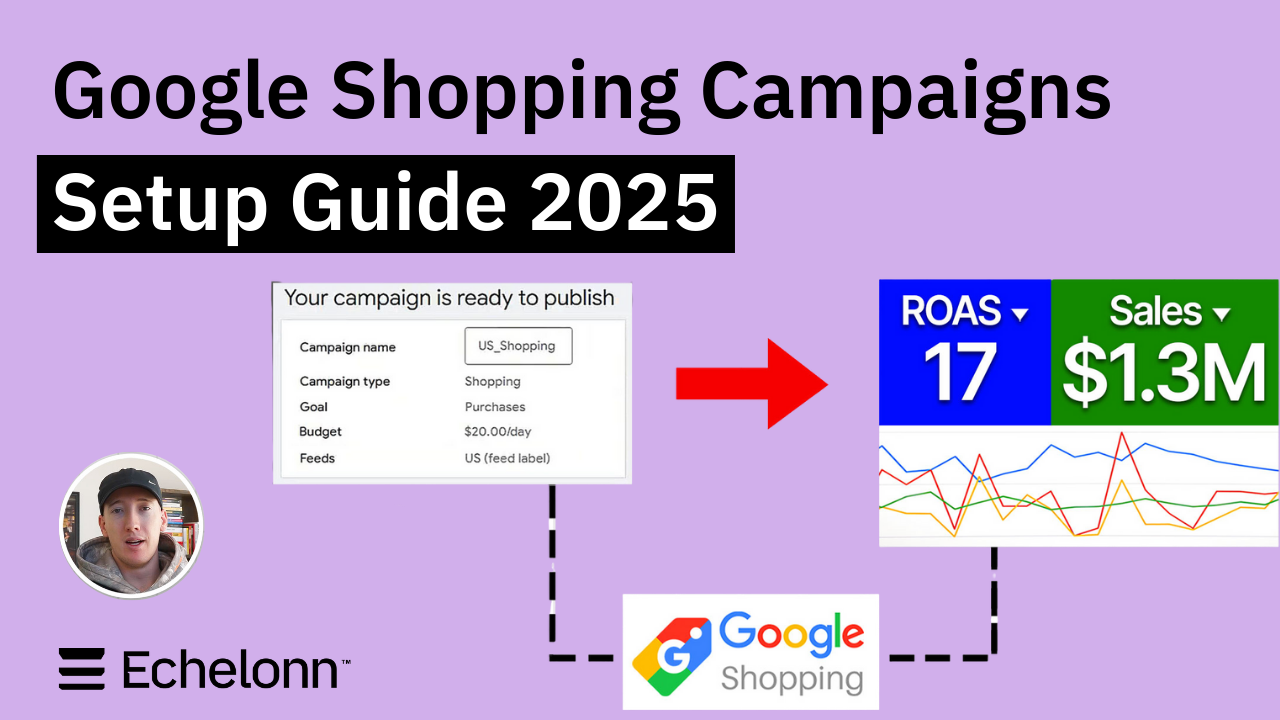
Google Shopping Campaigns Setup Guide 2025
%20(2).png)
Should You Run Google Ads for Your Website? (Honest Answer)
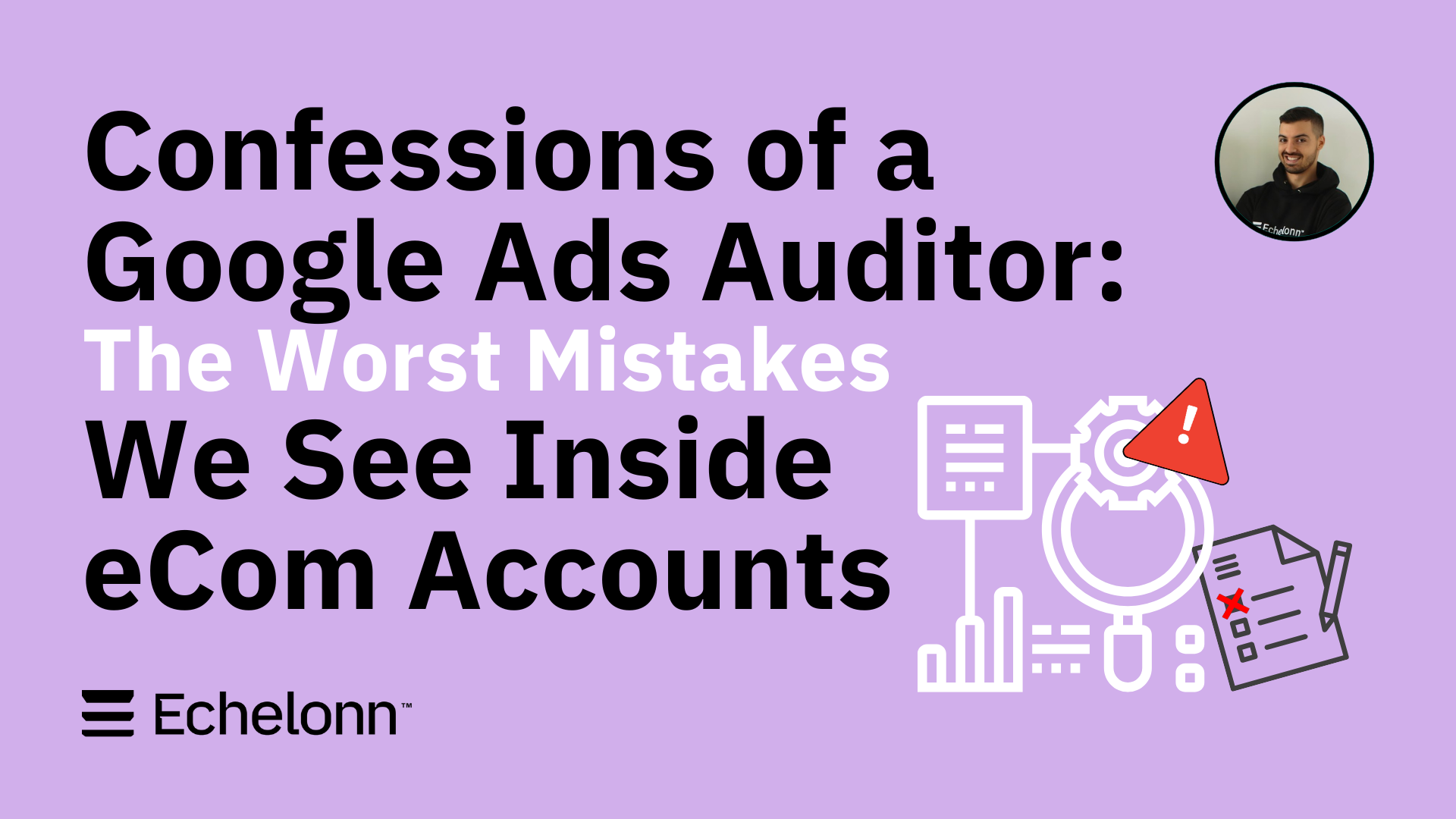
Confessions of a Google Ads Auditor: The Worst Mistakes We See Inside eCom Accounts
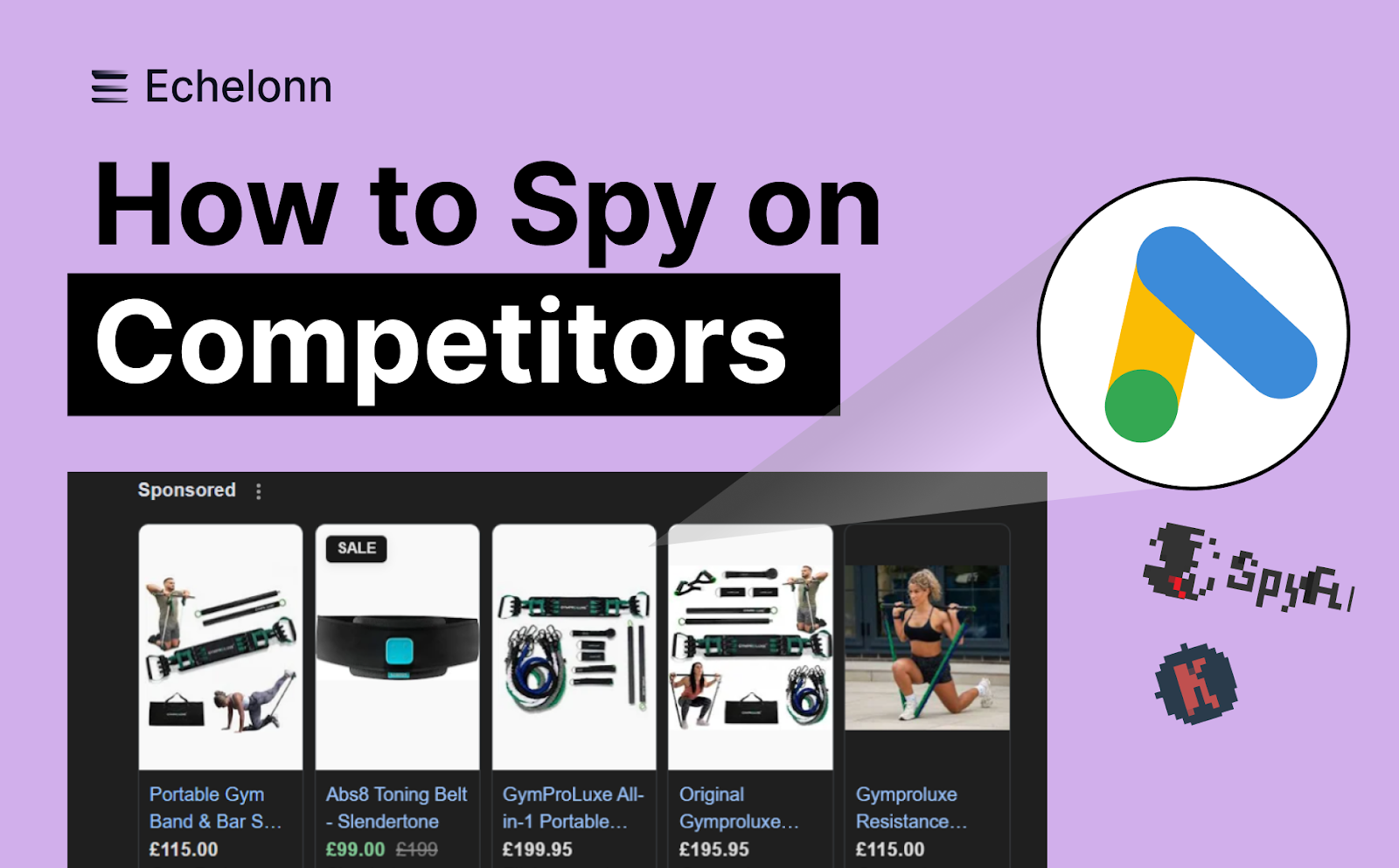
How to Spy on Competitor Google Ads: Complete 2025 Guide
%20(2).png)
7 Questions to Ask Before Hiring a Google Ads Consultant
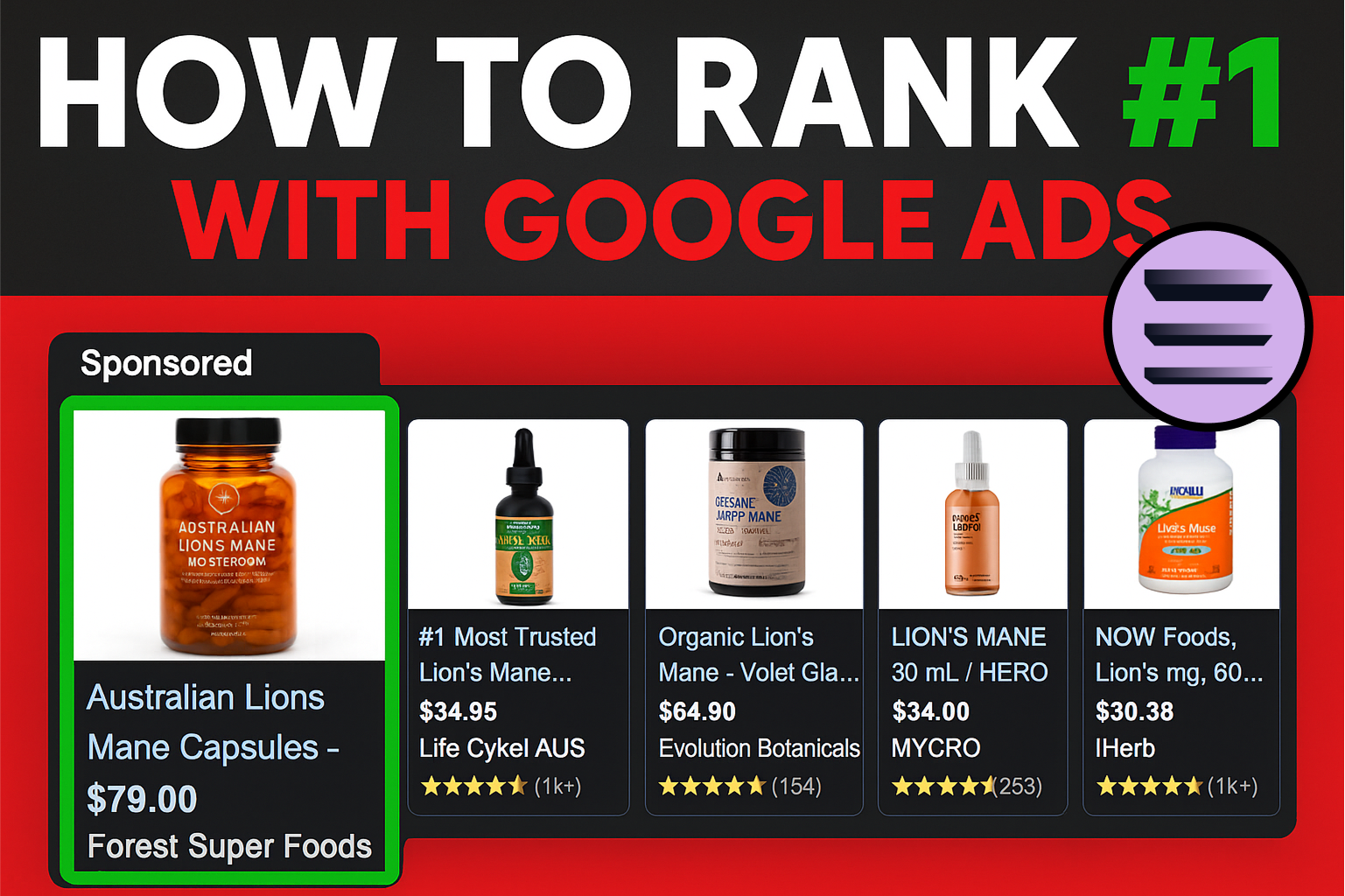
How to Rank #1 on Google Ads: Complete Shopping & Search Guide 2025
.png)
Learning Google Ads in 2025: The Roadmap Nobody Talks About
%20(1).png)
What Makes a Google Ads Specialist Worth $10,000/Month?

Why Cheap Google Ads Consulting Costs You $180,000+ in Lost Revenue
.png)
Why 99% of Google Ads Experts Fail (& How to Find One That Won’t)
.png)
5 Google Product Feed Fixes for eCom Growth
.png)
Google Ads Campaign Structure: Why 95% of Brands Waste Budget on Mixed Traffic

In-House vs Agency Google Ads: Which Delivers Better ROI in 2025?
.png)
How to Scale Google Ads With a Small Budget | Setup and Optimization

Google Shopping Optimization: 11 Proven Tactics for Maximum ROAS
%20(3).png)
eCom Growth Strategy: How We Scaled a Supplement Brand From $1.9M to $8.6M With Google Ads
%20(4).png)
Google Merchant Center Fix: How to Improve Rankings With Accurate Shipping Times

CTR Is Misunderstood by 95% of the PPC Industry (What to Optimise for Instead)
.png)
Google Ads AI | Manual vs Automated Campaign Performance

Complete YouTube Ads Guide 2025 | 3 Formats, 5 Principles, Proven Results
%20(2).png)
eCom Growth Strategy With Google Ads in 2025
.png)
Google Marketing Live 2025: 11 Key Takeaways for Marketers
%20(1).png)
YouTube Advertising Strategy: How to Drive Results Across Every Format
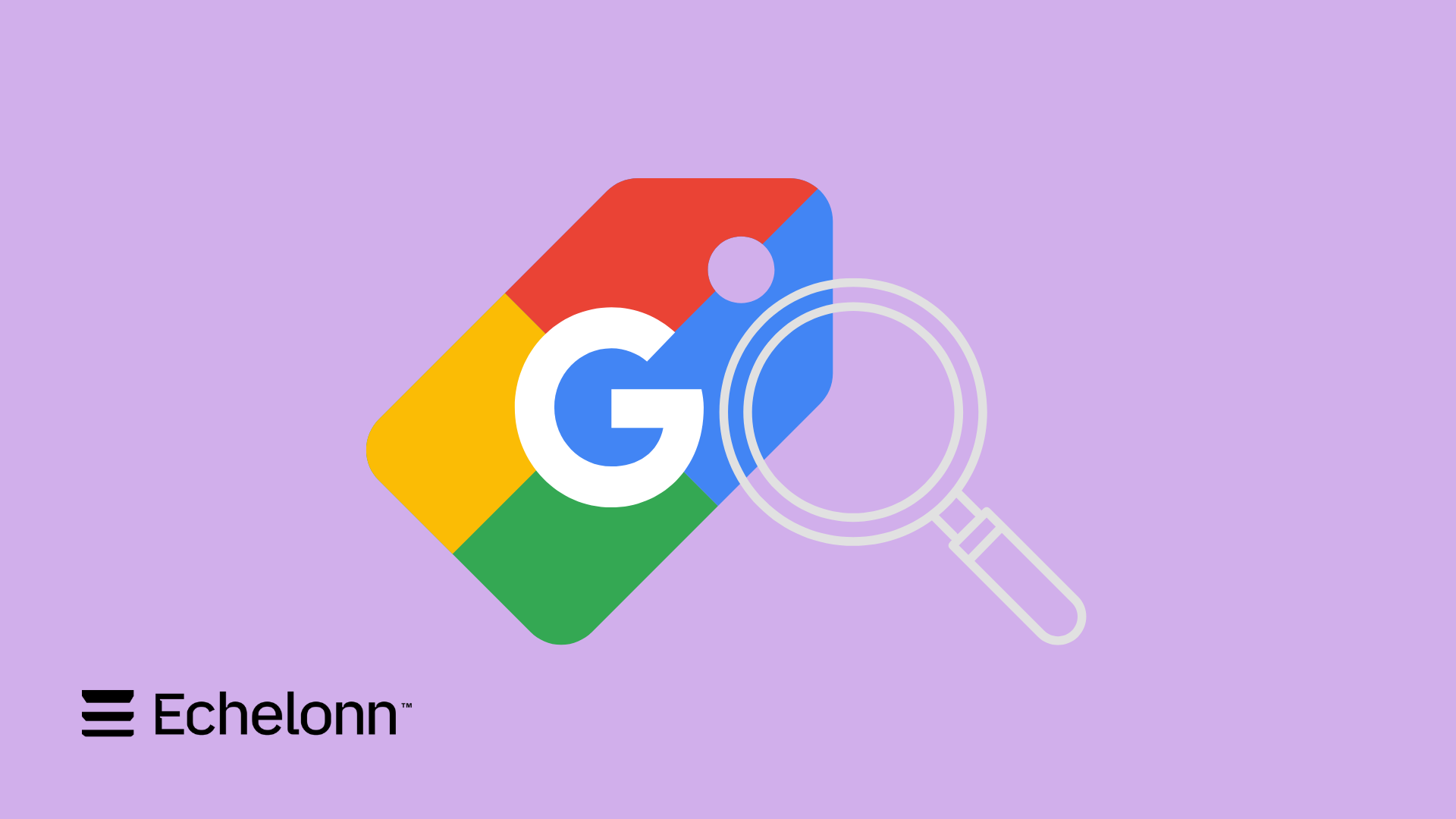
Google Shopping Feed Optimisation: Tips for Better Results

How Long Does it Take for Google Ads to Work?

YouTube Ads Cost in 2025: How to Launch & Optimize a YouTube Advertising Campaign

Search Ad Strategies to Maximize Sales with Google ads for eCommerce (2024)

2025 Google Shopping Ads: Ultimate Guide, Benchmarks, and Pricing Breakdown


.svg)

.svg)
.svg)





